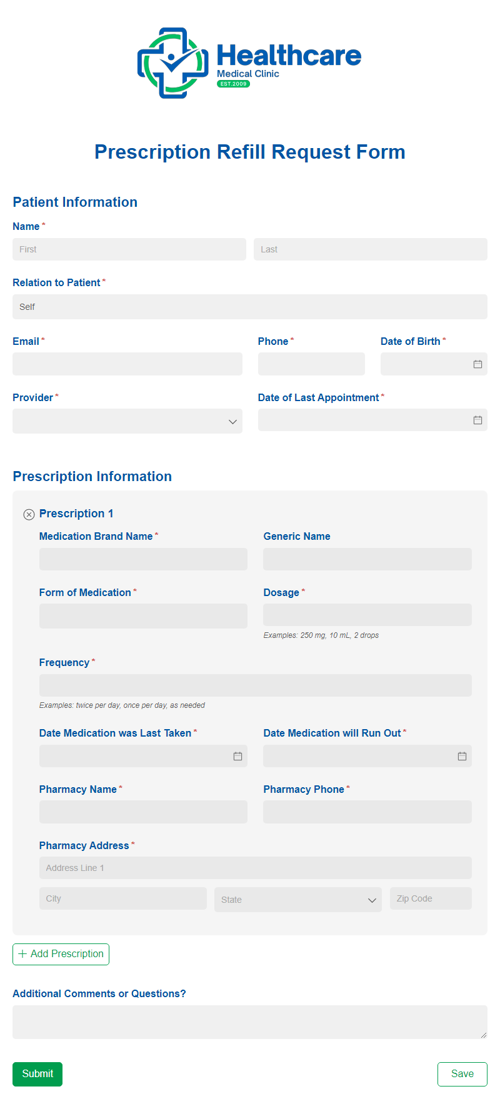Many companies use online tools to efficiently gather information from clients or patients. These platforms provide a simple way to process contact information or manage leads while ensuring compliance with security regulations like HIPAA.
The HIPAA Privacy Rule explicitly limits how patient data and protected health information (PHI) can be handled, requiring organizations to implement safeguards that maintain the integrity of PHI across their organizations. The rule protects sensitive patient data from unauthorized access and misuse while also giving patients the right to control their own medical information.
As the healthcare industry constantly evolves, organizations must prioritize HIPAA compliance to protect data captured by online forms. By enforcing strict security measures and granting patients access to their records, HIPAA fosters trust between healthcare providers and patients, enhancing the overall care process.
What is HIPAA Compliance?
Before we dive into how to use online forms and other patient-engagement tools securely, it’s important to examine the origins of the Health Insurance Portability and Accountability Act (HIPAA). In 1996, it was a groundbreaking new law that established the first nationally held standard for PHI in the U.S. (as well as the similar Personal Information Protection and Electronic Documents Act (PIPEDA) in Canada).
As technology improved, many significant changes have been made to HIPAA. For example, in 2013, the Breach Notification Rule was introduced, requiring that all patient data breaches affecting more than 500 individuals be reported to the Department of Health and Human Services’ Office for Civil Rights.
As technology continues to improve, HIPAA will inevitably change. That’s why working with healthcare software providers that stay updated with changing regulations is essential.
Why is HIPAA Compliance Important for Online Forms?
Online forms are a gateway to a treasure trove of personal health information. From appointment scheduling forms to medical history questionnaires, these digital forms can collect detailed and sensitive data from individuals. Healthcare organizations must ensure that any web forms comply with HIPAA regulations. This includes all connected workflow components involved in data storage, transmission, and processing to maintain patient information’s security and privacy throughout its entire lifecycle.
HIPAA compliance is essential for online forms in healthcare, offering multiple benefits beyond legal adherence. It significantly boosts patient trust, as compliance demonstrates a provider’s commitment to safeguarding personal data. This heightened trust is crucial in healthcare, where sensitive information is frequently exchanged. Furthermore, compliance lays a strong foundation for adapting to future regulations and maintaining high ethical standards in patient information management, reinforcing healthcare providers’ overall integrity and reputation.
Without proper safeguards, the data collected is vulnerable to breaches, potentially resulting in identity theft, financial loss, and a significant erosion of patient trust. Furthermore, non-compliance with HIPAA regulations can result in hefty fines and legal actions, not to mention a tarnished reputation. Therefore, ensuring HIPAA compliance in online forms is critical for the security and privacy of patient information and the integrity and reliability of healthcare services.
What Are the Key Components of HIPAA-Compliant Online Forms?
When choosing digital forms for your healthcare organization, it’s essential to prioritize HIPAA compliance. This is not only a legal requirement but also a commitment to patient privacy and data security.
Here are a few fundamental components:
Look for a company that requires a signed Business Associate Agreement (BAA) that legally binds them and any subcontractors to regulations regarding PHI.
Data encryption: Data transmitted via online forms must be encrypted both in transit and at rest. This ensures that even if the data is intercepted, it cannot be read or misused.
Role access: Controls should only allow authorized persons to access sensitive patient information electronically. This should include strong authentication methods, automatic logoff, and role-based access controls that can minimize the risk of unauthorized access.
Audit trails: It’s good practice to track and record detailed logs of user activity. This feature enables healthcare organizations to monitor access to ePHI, detect unauthorized or suspicious activities, and demonstrate compliance with HIPAA requirements in an audit or investigation.
Data integrity measures: Techniques such as checksums or digital signatures should be used to ensure that the data has not been altered or tampered with during transmission or storage. Select an online form tool with reliable data backup and recovery measures to swiftly restore patient information and prevent HIPAA violations and disruptions to patient care.
Secure hosting: The servers and infrastructure where the online forms and data reside should comply with HIPAA’s physical and technical safeguards.
How Can You Ensure Your Online Forms Are HIPAA Compliant?
Ensuring that your online forms are HIPAA compliant involves a series of strategic steps:
Choose the right vendors: Work with software providers with a proven compliance record and who offer products designed with HIPAA regulations in mind.
Regular risk assessments: Conduct and document regular risk assessments to identify vulnerabilities in your online forms and data handling processes. This will help you stay ahead of potential security threats.
Implement strong policies and procedures: Develop clear policies and procedures for handling PHI and ensure all employees are trained on these guidelines.
Stay Informed: HIPAA regulations can evolve, so staying informed about any changes or updates is crucial.
These requirements ensure that a patient’s health information remains protected, providing peace of mind and safeguarding your practice from the repercussions of unnecessarily exposing PHI.
Easily convert any paper processes.
Trusted for years by physician offices, medical centers and regional healthcare systems, Cognito Forms makes it easy to build and manage HIPAA-compliant online forms.
What Are the Common Pitfalls to Avoid in HIPAA Compliance?
Lack of employee training: Employees need regular training on HIPAA rules and proper handling of PHI to avoid unintentional breaches or violations.
Inadequate security measures: Failing to implement sufficient physical, administrative, and technical safeguards can leave PHI vulnerable to unauthorized access.
Poor access control: This includes not restricting access to PHI to only those who need it for their job function or employees sharing accounts.
Ignoring risk assessment or not completing risk assessments leaves an organization with potential compliance gaps and security risks.
Failing to secure a BAA: These agreements are required to maintain HIPAA compliance and outline the vendors’ responsibilities in protecting PHI.
Non-compliance with patient rights: Organizations sometimes fail to comply with patients’ rights under HIPAA, such as the right to access their medical records, request corrections, and receive a notice of privacy practices.
Ineffective incident response: Not having a clear and tested plan for responding to data breaches can exacerbate the consequences of any security incident.
Avoiding these pitfalls requires ongoing diligence, training, and a proactive approach to compliance and security measures, including choosing high-quality technology solutions to safeguard PHI effectively.
What Are the Consequences of HIPAA Violations?
Non-compliance with HIPAA regulations can lead to some serious consequences for healthcare organizations–including legal, financial, reputational, and operational repercussions.
The Office for Civil Rights (OCR) of the Department of Health and Human Services imposes fines on organizations for violating HIPAA regulations. These penalties can amount to millions of dollars, varying based on the seriousness and extent of the breach.
Patients with breached data may take legal action against your organization, resulting in expensive civil lawsuits and settlements. Data breaches can harm your reputation and damage your organization’s brand image, losing future patients and business opportunities.
Additionally, dealing with the aftermath of a data breach or regulatory investigation can disrupt normal operations, leading to productivity losses and increased expenses for remediation efforts.
Easily Set Up HIPAA Compliant Online Forms with Cognito Forms
As trusted partners for physician offices, medical centers, and regional healthcare systems worldwide, we understand the unique demands and challenges of the healthcare industry. Our platform simplifies the creation and management of HIPAA-compliant forms that can integrate directly with your existing Electronic Medical Record (EMR) systems. This allows healthcare providers to focus on delivering top-quality care without the added burden of complex data management.
We mandate a signed Business Associate Agreement (BAA) for all HIPAA accounts, underlining our commitment to compliance and data protection. Features like HTTPS-only access, encryption of data in transit and at rest, automatic logoffs at 1 hour, and specific data field encryptions ensure that Cognito Forms provides a secure, compliant, and efficient solution for healthcare providers.



